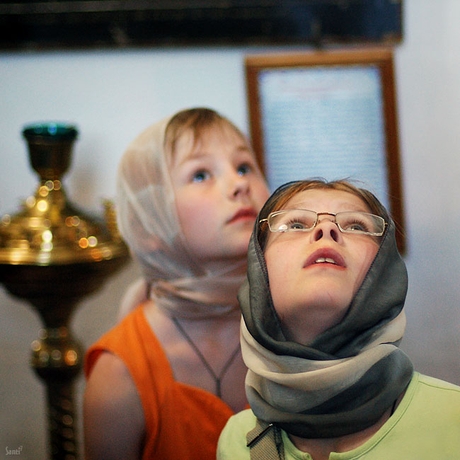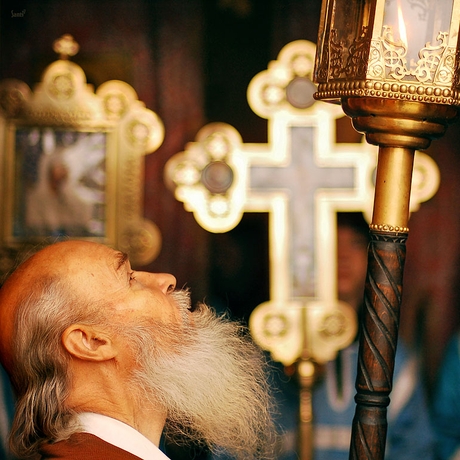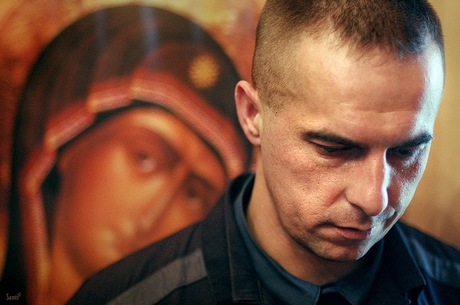Source: St. Nektarios information on the Orthodox Faith
Introduction
What is human free will? Is it the ability to choose between good and evil? or is human freedom limited to a choice between things, e.g., choosing between a cup of coffee and a cup of tea? Do human beings in fact have any freedom at all? When we ask these questions, we have nothing political in mind. We do not ask here about human or civil rights — which can be given or taken away by the state — but the greater question about the – faculties of human nature.

1.
Philosophers commonly disagree about the definition of free will and the human capacity to use it. Some have said that man is a machine, who must follow the laws ofhis nature; therefore, he is neither free to choose between good and evil (whatever they are) nor even between things. Even if he could overcome the laws of nature, he would, as some ancient Greeks said, be subject to “fate” (moira, eir mene) whose decisions must be fulfilled. Thus, choice is a delusion.
Augustine, the 5th century Bishop of Hippo, seems to have adapted the Greek idea of fate. When discussing “predestination,” that is, before the creation of the world, God decided who would live with Him forever, and those who would dwell in penal fire for eternity. Augustine called those whom God has predestined to heaven, the Elect, and to hell, the Reprobate. Thus, only the Elect have the ability to choose between good and evil, for they alone have been given the grace to make such choices. This is a revolutionary theory .
It is contrary to the teachings of the Church which teaches, in the words of St. John of Damascus, that God “know all things beforehand, but He does not predetennine them. Although He knows what is in our power, He does not predetennine it” (De Fid. Orth.. II, 30). Man is free because he was created in “the image of God.”
Materialists have postulated that man is a soulless machine and subject to the laws of nature. Freedom is an illusion. We eat what we eat, think what we think, live as we live, according to the iron laws of the universe.
Other philosophers reject the idea of the materialists. The 18th century philosopher, Immanuel Kant, said that not only must we believe that man is free, but also he has an immortal soul, and that God exists. The idea of freedom cannot exist without the idea of God and immortality. Without such beliefs, the happy life and civilization are impossible.
Some modem philosophers argue that Kant did not go far enough. He should have given greater attention to man a living organism with a spirit. His body may be chained to the law of cause and effect, but his soul or spirit is free. In the words of Nicholas Berdayaev, “Man is an enigmatic being because he is not the product of natural processes, but is the child of freedom which springs from the abyss of non-being. ” Man possesses a divine element within him and, therefore, he is free, with the power to create beauty, to do good, to love justice. Certainly, man’s body is controlled by the strictures of time and space, but his spirit is free to transcend all the laws of his finite nature. His spirit takes him where his body cannot go.
Curiously, modern thinkers ignore the fact that their theories about God, man, his soul and freedom are nothing new. They were first stated by the ancient Greeks and restated in the post-Orthodox Latin Middle Ages, only to reemerge in modernity under different guises. What does the Orthodox Church teach about free will? None of the above. She has never been concerned about the so-called discoveries of human reason. Rather she trusts the sacred Scriptures and her holy Fathers.

2.
Let me introduce the Christian teaching on free will with a few preliminary remarks.
First, one must understand that free will does not mean the ability to do whatever we want. We cannot stop eating and breathing without eventually terminating our existence. We cannot prevent the aging process, nor lift a mountain, nor swallow the ocean. We are limited — – not paralyzed — by our nature, the force of circumstance, the laws of Nature.
Second, we are restricted by the passions. The passions limit the scope of our choices. Thus, a person addicted to drugs has not the same liberty as a person free of them. Sin limits our choices. In other words, our liberty expands with the purity of the soul and body. In the Age to Come, St. Gregory ofNyssa says, the saved will have an infinite number of choices. In hell the damned will have no choice at all.
Third, our liberty is restricted by ignorance. What we do not know, we cannot choose, except, perhaps, by chance. But that would not be free choice. Freedom involves deliberation. Ignorance is an excuse only for them who have no ability or opportunity to learn, e.g., an infant has no knowledge and, strictly speaking, it has no freedom to choose. But then it knows neither good nor evil. The same may not be said of the normal adult. In any case, God will judge us according to the way we exercised our freedom.
Fourth, there are matters entirely beyond our control, such as those things which God has reserved for Himself only God has autarkeia or is self-sufficient, absolutely independent; only God is autexousios or complete “self-authority”, “self-power”, without any authority over Him.
3.
How does the Church define “free will”? It has two meanings and they are interrelated. It is the ability to choose between good and evil and between one thing and another. In every choice there is the risk of sin, unless we call upon the Grace of God to aid« us.
No choice, which excludes the Grace of God, contributes to our salvation for by grace are ye saved (Eph. 2:6) declared St Paul. Grace also expands our choices, purifies and directs them, especially choices which lead to our salvation.
But whether we choose between things physical or things spiritual, our choices always involve the power to choose between good and evil. In today’s world, for example, there are many who believe that alcoholism is a disease. The alcoholic is not a sinner, but a victim. Yet, in truth, alcoholism is the result of cumulative choices which impacts upon the body and cause chemical changes in it. Although alcoholism may compel a person to drink, it was free choice in the first place which led to his slavery to alcohol.

4.
Augustine of Hippo taught that “original sin” makes it impossible for us to choose between good and evil and, therefore, to take any part in our salvation. Before the creation of the world, God knew that Adam would fall and plunge his posterity into sin, death and corruption. Knowing this, God arbitrarily predestined some to salvation, others to damnation. Why He decided to save some and not others, we cannot know. To the chosen few, the Elect, He imposed grace irresistibly. They have the ability to choose between good and evil. The rest of the human race deludes itself by thinking that it has the same choices.
Now, although he is wrong about predestination and compulsory grace, there is some truth in what Augustine said. The liberty of Christians differs from the liberty of the unbeliever, he who is outside the influence of God’s saving Grace. Nevertheless, he too was made in the image of God, and for that reason he always has the power of choice, limited as it may be by his passions and ignorance.
To be sure, choice depends upon knowledge; and upon the knowledge of God’s Revelation, which presents the greatest number of choices. No one can say that he has not had the possibility to know the Will of God — not today, not with the communications explosion, not with all the schools, libraries, television, etc.
More than these, as St. Paul asserts, nature herself teaches us about God (Rom. 1); or, as as St. John ofDamascus says (De Fid. Orth. 1,2), the knowledge of God is implanted in us by nature. And knowing God, even in a limited way, none may say that it is impossible for him to turn to God.
Put another way, with the knowledge of God comes the knowledge of the good and, by implication, the knowledge of evil; and, consequently, the possibility to choose between them. Without that knowledge and the choices that result from them, we are left with no explanation for human existence except fate or predestination, some unknown destiny. Understanding ourselves this way, is to deprive human choice and action of all meaning Worse, if there were a God, we would need to blame him for all evil. Not even the devil, if one existed! , could be held responsible for his conduct.
Thus, the Fathers declare that God exists, that man has a soul. He is free to choose, and not even the Grace of God is compulsory. As St. Justin Martyr writes in his first Apology, 43,
So that none may infer what we have said about the events we have described. ..the
penalties and punishments, and the good rewards are given according to each man’s
action. If this not so, but all things happened in accordance with fate, nothing would be
left us. For if it is destined that one man should be good and another wicked, then
neither is the one to be praised, nor the other blamed.
St. Irenaeus concurs:
This expression of our Lord, “How often would I have gathered thy children together,
and thou wouldest not, (Matthew 23:37) II , set forth the ancient law of human liberty,
because God made man a free agent from the beginning, possessing his own power,
even as he does his own soul, to obey the behests of God voluntarily, and not by
compulsion of God. For there is no coercion with God, but a good will towards us is
present with Him continually. And therefore does He give good counsel to all. In man,
as well as the angels, He has placed the power of choice…so that those who had yielded
obedience might rightly possess the good, given indeed by God, but preserved by
themselves. On, the other hand, they who have not obeyed, shall, with justice, be not
found in possession of the good, and shall receive condign punishment : for God did
kindly bestow on them what was good;… (Against the Heresies, IV, 37, I).
Contrary to Augustine, the Grace of God is not arbitrarily forced upon some and denied to others. Grace is freely given, freely received. To quote St. Faustus of Riez,
We, however, maintain that whosoever is lost is lost by his own fault; yet, he could
have obtained salvation through grace had he cooperated with it; and, on the other hand,
whoever through grace attains to perfection by means of cooperation, might
nevertheless, through his own fault, his own negligence, fall and be lost. We exclude, of
course, all personal pride, since we insist that all we possess has been freely received
from the Hand of God (Concerning Grace, 1)
And, finally, St. John Cassian asserts,
These two, namely, grace and free will, although they seem opposed, in fact are
complementary …Were we to deny the one or the other, we would appear to have
abandoned the Faith of the Church (Conversations with the Desert Fathers, 18).
The cooperation between God’s Grace and man’s free will, the Church calls “synergy” or acting together of two energies, human and Divine. What God freely gives, we are free to accept or reject. At the same times, there are some things God will not give us nor will He let us know about them. For, as the Apostle Paul has written, Eye hath not seen, nor ear heard, neither have entered into the heart of man, the things which God hath prepared for them that love Him (1 Cor. 2:9).
Conclusion
Philosophers cannot help us know whether we have free will. They do not agree among themselves. Their theories, based on unproven assumptions, are open to serious criticism. Also religious doctrine about predestination and fate only put the blame for evil on God and deprive human beings of praise and blame for their choices, for their vice and virtue. The knowledge of free will comes by faith and experience. God created man in His Image, which means that man has free will. The freedom which has been implanted by God in created human nature is curtailed only by sin and ignorance. Without freedom life is meaningless.
The above was given as a lecture at a Conference held at St. Anna’s Orthodox Church on Saturday, October 22, 1994.
Published by: St. Nicholas Educational Society 26 Edgemont Street Roslindale, MA, 02131-1923
















